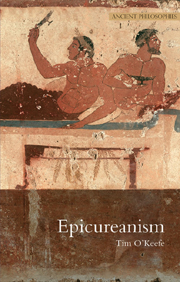Book contents
- Frontmatter
- Contents
- Preface
- Acknowledgements
- Sources and abbreviations
- Chronology
- 1 Introduction: the life of Epicurus and the history of Epicureanism
- I Metaphysics and physics: introduction and overview
- II Epistemology: introduction and overview
- III Ethics: introduction and overview
- 11 Pleasure, the highest good
- 12 Varieties of pleasure, varieties of desire
- 13 The virtues and philosophy
- 14 Justice
- 15 Friendship
- 16 The gods
- 17 Death
- Glossary of terms
- Notes
- Further reading
- Bibliography
- Index
14 - Justice
from III - Ethics: introduction and overview
- Frontmatter
- Contents
- Preface
- Acknowledgements
- Sources and abbreviations
- Chronology
- 1 Introduction: the life of Epicurus and the history of Epicureanism
- I Metaphysics and physics: introduction and overview
- II Epistemology: introduction and overview
- III Ethics: introduction and overview
- 11 Pleasure, the highest good
- 12 Varieties of pleasure, varieties of desire
- 13 The virtues and philosophy
- 14 Justice
- 15 Friendship
- 16 The gods
- 17 Death
- Glossary of terms
- Notes
- Further reading
- Bibliography
- Index
Summary
Epicurus develops an innovative social contract theory of justice. Justice is a human invention, which comes into existence when we gather together to form communities and agree not to harm one another. Apart from such an agreement, there is no justice. The particulars of what is just depend on the content of the agreement that we make with one another, and justice is thus relative from place to place and time to time. This, however, does not make justice “merely” conventional or relative in a way that undermines its authority or gives the wise person any reason to be unjust. Epicurus strives to repair problems afflicting earlier versions of a social contract theory, such as that advanced by Glaucon in book two of Plato's Republic. Still, despite his defence of justice, Epicurus advocates a life that avoids political engagement.
Epicurean contractarianism and its implications
The “justice of nature” is an agreement not to harm one another, which is useful for the parties to the agreement (KD 31). Human beings form societies in order to escape the dangers of living in a pre-social state of nature, such as starvation, death from exposure to the elements and animal attacks (DRN V 982–1028). Agreeing to cooperate with one another in order to protect ourselves from such dangers is beneficial to everybody. But in order to have a functioning society, in which the members are able to live free of fear, we need to have agreements about how to treat one another.
- Type
- Chapter
- Information
- Epicureanism , pp. 139 - 146Publisher: Acumen PublishingPrint publication year: 2009

